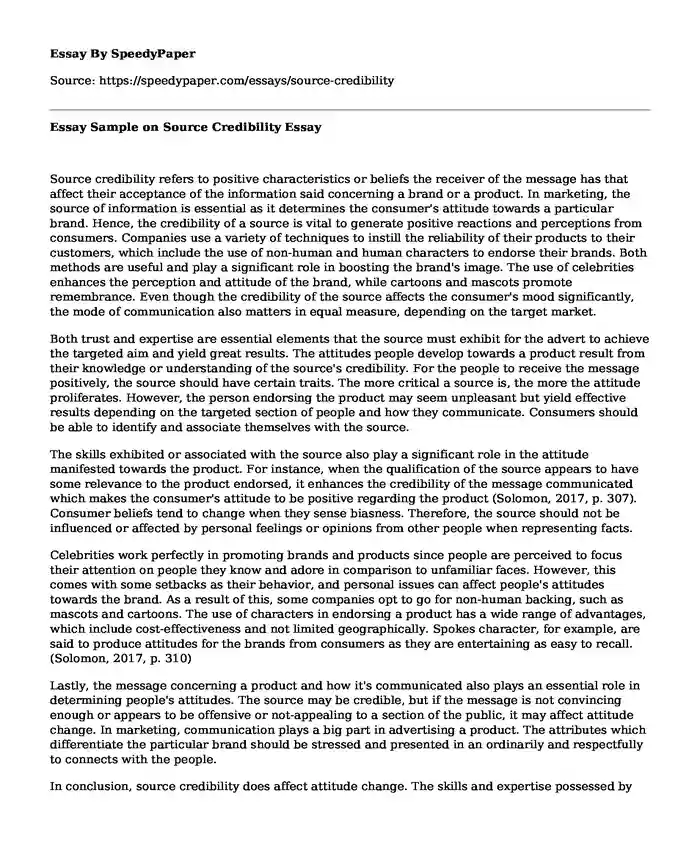
| Type of paper: | Essay |
| Categories: | Branding Human behavior Customer service |
| Pages: | 3 |
| Wordcount: | 611 words |
Source credibility refers to positive characteristics or beliefs the receiver of the message has that affect their acceptance of the information said concerning a brand or a product. In marketing, the source of information is essential as it determines the consumer's attitude towards a particular brand. Hence, the credibility of a source is vital to generate positive reactions and perceptions from consumers. Companies use a variety of techniques to instill the reliability of their products to their customers, which include the use of non-human and human characters to endorse their brands. Both methods are useful and play a significant role in boosting the brand's image. The use of celebrities enhances the perception and attitude of the brand, while cartoons and mascots promote remembrance. Even though the credibility of the source affects the consumer's mood significantly, the mode of communication also matters in equal measure, depending on the target market.
Both trust and expertise are essential elements that the source must exhibit for the advert to achieve the targeted aim and yield great results. The attitudes people develop towards a product result from their knowledge or understanding of the source's credibility. For the people to receive the message positively, the source should have certain traits. The more critical a source is, the more the attitude proliferates. However, the person endorsing the product may seem unpleasant but yield effective results depending on the targeted section of people and how they communicate. Consumers should be able to identify and associate themselves with the source.
The skills exhibited or associated with the source also play a significant role in the attitude manifested towards the product. For instance, when the qualification of the source appears to have some relevance to the product endorsed, it enhances the credibility of the message communicated which makes the consumer's attitude to be positive regarding the product (Solomon, 2017, p. 307). Consumer beliefs tend to change when they sense biasness. Therefore, the source should not be influenced or affected by personal feelings or opinions from other people when representing facts.
Celebrities work perfectly in promoting brands and products since people are perceived to focus their attention on people they know and adore in comparison to unfamiliar faces. However, this comes with some setbacks as their behavior, and personal issues can affect people's attitudes towards the brand. As a result of this, some companies opt to go for non-human backing, such as mascots and cartoons. The use of characters in endorsing a product has a wide range of advantages, which include cost-effectiveness and not limited geographically. Spokes character, for example, are said to produce attitudes for the brands from consumers as they are entertaining as easy to recall. (Solomon, 2017, p. 310)
Lastly, the message concerning a product and how it's communicated also plays an essential role in determining people's attitudes. The source may be credible, but if the message is not convincing enough or appears to be offensive or not-appealing to a section of the public, it may affect attitude change. In marketing, communication plays a big part in advertising a product. The attributes which differentiate the particular brand should be stressed and presented in an ordinarily and respectfully to connects with the people.
In conclusion, source credibility does affect attitude change. The skills and expertise possessed by the source and how well they represent and identify themselves with the message they are communicating affect attitude change. However, the choice of words used, and the presentation also play a role in influencing attitude change. Lastly, a source, even though unpleasant, can affect attitude change depending on their connection with target consumers.
Reference
Solomon, M.R. (2017). Consumer behavior: buying, having and being. (12th Ed). Boston: Pearson.
Cite this page
Essay Sample on Source Credibility. (2023, Apr 10). Retrieved from https://speedypaper.net/essays/source-credibility
Request Removal
If you are the original author of this essay and no longer wish to have it published on the SpeedyPaper website, please click below to request its removal:
- Free Education Essay: College and Trade School
- Nursing Research Paper Example on Intra-urethral Lubricating Gel
- My Experience at an Evangelical Church - Personal Essay Sample
- Maltese Language Essay Sample
- Argumentative Essay Example on the Euthanasia Issue
- Evaluation Essay Sample on Website for Universal Health Care
- Free Essay on Selling Is the Pillar of Any Enterprise
Popular categories




